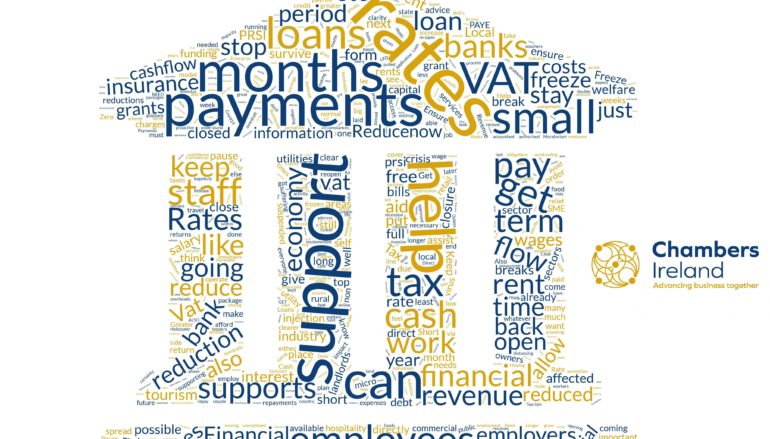

Chamber survey says 90% of Businesses experiencing Decline in Revenue – Unprecedented Economic Response Required
Chambers Ireland and our nationwide network of chambers has today (24 March 2020) published the results of a survey of its members, which seeks to quantify and highlight the impacts of COVID-19 on business in towns, cities and regions right across the country.
Our survey which has over 1,000 responses (1,110) was conducted between the afternoon of the 19 March and the morning of 23 March 2020
Today’s results will inform the advocacy of Chambers Ireland and affiliated chambers, on behalf of businesses throughout the country and provide guidance to the Government on next steps required to support business through the crisis.
The headline results are:
- 94% of businesses see their revenue declining over the coming three months
- 73% of businesses expect their revenue to decline by in excess of 25%
- Cashflow, Revenue, and Staffing are the critical issues for businesses
- Cashflow and Revenue are of greatest concern to Sole Traders, and Micro-businesses (<10 employees) [This sector accounts for in excess of 92% of businesses, and 69% of jobs in the workforce[1]]
- Temporary closures only impacting a minority of businesses (Hospitality in particular) but deeply affects these sectors.
- Staffing is of concern to certain sectors, particularly Digital, Agrifood, Transport, and Retail.
- No part of the country feels unaffected, though the midlands are slightly more concerned about staffing problems.
Speaking today, Chambers Ireland Chief Executive Ian Talbot said,
“The results of our network survey show us that the impact of COVID-19 on the business community in Ireland, the vast majority of whom are SMEs, has been severely felt, with more than 90% experiencing reduced cash-flow and reduced revenue.
As we publish these results, we are expecting further announcements from Government of tighter restrictions on how people move around and interact with each other. This will further impact the business community. Sentiment in the business community can only be expected to decline in the days and weeks to come.
A significant response by the State to support businesses and local economies right across the island is required. This must be far-reaching and unlike any intervention we’ve seen before. These are unprecedented times and therefore need an unprecedented response.
Government must give businesses and the self-employed a lifeline immediately, and when the coronavirus threat passes ensure that the businesses community is supported through further state interventions. Employers’ are job creator, without whom we would not have an economy and would not be able to support the economic well-being of citizens. For jobs to be restored following the crisis, our members will need as much support as possible to re-boot the economy.
Under-reacting to this crisis is now the greatest risk. This crisis will pass, our economy will recover, but we cannot afford a chaotic recovery.
Government measures to date have the approval of almost 70% of the business community despite the huge costs borne by them. But Government must become more responsive in a number of key areas.
Deferrals and moratoriums on VAT, commercial rates and other changes must last for the duration of the crisis at a minimum. The business sector also requires greater clarity on insurance. We call on Government to work with the insurance sector in providing solutions for the business community.
The pace at which Government departments and agencies are operating at to respond to the crisis is applauded but it is important to ensure that the detail of schemes announced is carefully considered and communicated. When this does not happen, it adds to the confusion and uncertainty facing our local economies.
Finally, as is highlighted in the results of our Network survey, cash-flow will be critical to surviving the crisis. We reiterate our call to all Government Departments, agencies, Local Authorities, State and Semi-State bodies to pay invoices at the earliest opportunity. Government must take the lead on this and make a clear statement on the urgent necessity that all State bodies settle all outstanding bills promptly.
As a Network, we stand ready to work with the State to meet the challenge of this crisis and support the business community through it.”
[1] https://www.cso.ie/en/releasesandpublications/ep/p-bii/bii2015/sme/








